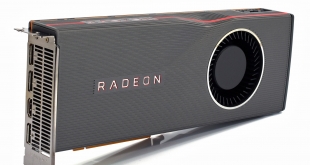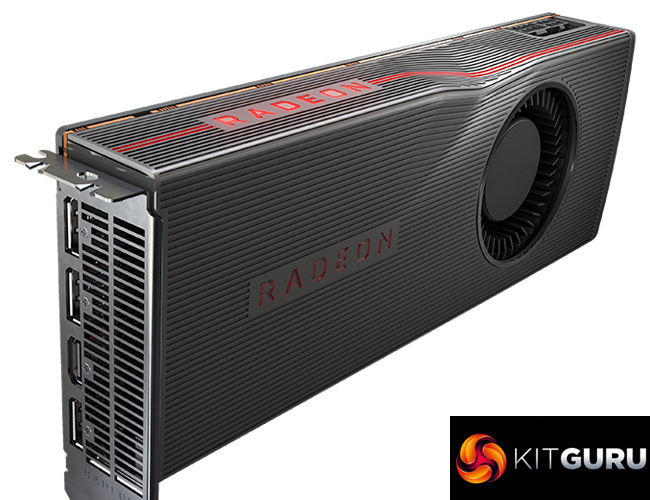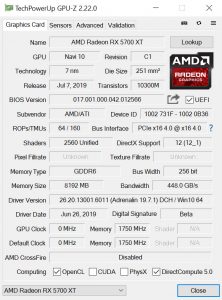
Alongside the launch of its new Ryzen 3000 processors, AMD is also releasing two new graphics cards in the shape of the Radeon RX 5700, and the RX 5700 XT. Rather than going after the high-end market segment, these cards are targeting the £350-450 market segment – so they're far from entry-level, but neither are they rivalling the likes of the RTX 2080 or 2080 Ti.
We have launch day reviews of both cards, but this article is all about the RX 5700 XT. If you want to read our coverage of the RX 5700 you can do so over here, but in this review everything boils down to one question – is the RX 5700 XT a worthy competitor to Nvidia's RTX 2060 SUPER?
AMD's Radeon RX 5700 XT was meant to go head-to-head with the RTX 2070, but only this week saw the release of the new RTX 2070 SUPER, raising the bar that bit higher for AMD's new card. We had a further plot twist on Friday, when AMD announced that it had actually cut pricing of the new cards – with the RX 5700 coming in at $349, and the 5700 XT now at $399.
I have to say, this is a ballsy move on AMD's behalf, and it really ups the ante – 5700 XT is now going head to head with 2060 SUPER, while 5700 competes directly against the original RTX 2060.
| RX 5700 | RX 5700 XT | RX Vega 56 | RX Vega 64 | Radeon VII | |
| Architecture | Navi | Navi | Vega 10 | Vega 10 | Vega 20 |
| Manufacturing Process | 7nm | 7nm | 14nm | 14nm | 7nm |
| Transistor Count | 10.3 billion | 10.3 billion | 12.5 billion | 12.5 billion | 13.2 billion |
| Die Size | 251mm² | 251mm² | 486mm² | 495mm² | 331mm² |
| Compute Units | 36 | 40 | 56 | 64 | 60 |
| Stream Processors | 2304 | 2560 | 3584 | 4096 | 3840 |
| Base GPU Clock | Up to 1465MHz | Up to 1605MHz | 1156 MHz | 1274 MHz | 1400 MHz |
| Game GPU Clock | Up to 1625MHz | Up to 1755MHz | n/a | n/a | n/a |
| Boost GPU Clock | Up to 1725MHz | Up to 1905MHz | 1471 MHz | 1546 MHz | 1750 MHz |
| Peak Engine Clock | n/a | n/a | 1590 MHz | 1630 MHz | 1800 MHz |
| Peak SP Performance | Up to 7.95 TFLOPS | Up to 9.75 TFLOPS | Up to 10.5 TFLOPS | Up to 12.7 TFLOPS | Up to 14.2 TFLOPS |
| Peak Half Precision Performance | Up to 15.9 TFLOPS | Up to 19.5 TFLOPS | Up to 21.0 TFLOPS | Up to 25.3 TFLOPS | Up to 28.1 TFLOPS |
| Peak Texture Fill-Rate | Up to 248.4 GT/s | Up to 304.8 GT/s | Up to 330.0 GT/s | Up to 395.8 GT/s | 432.24 GT/s |
| ROPs | 64 | 64 | 64 | 64 | 64 |
| Peak Pixel Fill-Rate | Up to 110.4 GP/s | Up to 121.9 GP/s | Up to 94.0 GP/s | Up to 98.9 GP/s | 115.26 GP/s |
| Memory | 8GB GDDR6 | 8GB GDDR6 | 8GB HBM | 8GB HBM | 16GB HBM2 |
| Memory Bandwidth | 448 GB/s | 448 GB/s | 410 GB/s | 483.8 GB/s | 1 TB/s |
| Memory Interface | 256-bit | 256-bit | 2048-bit | 2048-bit | 4096-bit |
| Board Power | 185W | 225W | 210W | 295W | 300W |
Both of AMD's new graphics cards are built upon its latest RDNA architecture, the long-awaited successor to Graphics Core Next (GCN). These cards use the same Navi GPU, where the RX 5700 XT is a full implementation with 40 Compute Units (CUs) and 2560 stream processors. RX 5700 is cut down slightly, to 36 CUs and 2304 stream processors.
A lot has been made of AMD's move to a new 7nm process for these cards – hence the 7/7 release date – and one consequence of this is a much smaller die size for the Navi GPU. Where the 14nm Vega 64 GPU die measures 495mm², Navi is just 251mm², and AMD claims a 2.3x performance per area increase for Navi vs Vega 10.
On top of this, clock speeds have been cranked up, with base clock increases from 1274MHz for Vega 64, up to 1605MHz for RX 5700 XT. AMD is also introducing a new clock speed metric known as ‘game clock', meaning the frequency which you can expect to see the card hit while gaming, and for the 5700 XT that is up to 1755MHz.
Interestingly, AMD is no longer equipping its cards with High Bandwidth Memory (HBM), instead opting for 8GB of GDDR6 memory with a 256-bit bus. Total memory bandwidth comes in at 448GB/s.
Lastly, total board power for the 5700 XT is rated at 225W, down from 295W for Vega 64 – AMD is claiming a 1.5x performance per watt increase for the new cards.
 KitGuru KitGuru.net – Tech News | Hardware News | Hardware Reviews | IOS | Mobile | Gaming | Graphics Cards
KitGuru KitGuru.net – Tech News | Hardware News | Hardware Reviews | IOS | Mobile | Gaming | Graphics Cards




